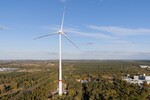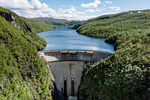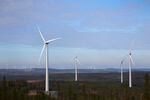News Release from windfair.net
Wind Industry Profile of
Business As Usual - Otherwise Sue 'Em!
It was such a nice scenario: One of the few positive effects of the global COVID-19 crisis was the initial drop in carbon dioxide emissions last year. But the joy of this was short-lived, as by December 2020 emissions were back above 2019 levels at 2%, or 60 million tonnes, the International Energy Agency (IEA) announced.
“The rebound in global carbon emissions toward the end of last year is a stark warning that not enough is being done to accelerate clean energy transitions worldwide. If governments don’t move quickly with the right energy policies, this could put at risk the world’s historic opportunity to make 2019 the definitive peak in global emissions,” said IEA Executive Director Fatih Birol. “In March 2020, the IEA urged governments to put clean energy at the heart of their economic stimulus plans to ensure a sustainable recovery. But our numbers show we are returning to carbon-intensive business-as-usual. This year is pivotal for international climate action – and it began with high hopes – but these latest numbers are a sharp reminder of the immense challenge we face in rapidly transforming the global energy system.”
Birol is still hoping, however, that countries will raise their climate ambitions like the European Union with the Green Deal. But fossil fuel companies won't give up without a fight, because they have a powerful tool on their side: the Energy Charter Treaty (ETC). With the help of this agreement from the 1990s, companies can sue against a state's climate and environmental protection measures if they reduce their profits. Swedish company Vattenfall, for example, has already used the treaty twice to sue Germany, once over environmental regulations for the Moorburg coal-fired power plant in Hamburg and once over Germany's nuclear phase-out. Only recently, German energy company RWE filed a lawsuit against the Netherlands for the decision to phase out coal by 2030. The claim is for 1.4 billion euros in damages - money that would be better spent on climate protection.

On the one hand, long-established energy companies are earning big money with renewables, on the other they insist on receiving rediculously high sums for their fossil technologies. If necessary, by taking legal action. (Image: Pixabay).
The list of lawsuits is already long today - and it grows every year. "The higher the climate protection ambitions of the EU, the more "lost" profits of fossil energy companies occur and the more lawsuits happen," as German media outlet Energiezukunft aptly summarises.
In the case of the German coal phase-out by 2038 at the latest, the German government has therefore already awarded compensation to RWE and Leag as a precautionary measure in the event of the closure of their power plants to avoid lawsuits. This in turn has led to a review by the EU Commission. Issue is the amount of compensation.
Executive Vice-President Margrethe Vestager, in charge of competition policy, said: "The phase-out of lignite-fired power plants contributes to the transition to a climate-neutral economy, in line with the European Green Deal objectives. In this respect, our role is to safeguard competition by making sure that the compensation granted to the operators of the plants for phasing out earlier than foreseen is kept to the minimum necessary. The information currently at our disposal does not allow us to confirm this with certainty, and we will now investigate this further."
As a result, Germany is likely to be faced with the situation of either paying a fine for excessive compensation (to the EU) or being brought before an arbitration court where, in the worst case, another big fine would be imposed. The plaintiffs in this case are precisely those companies which, in turn, run huge PR campaigns on becoming fossil-free within a generation (Vattenfall), or being the world's second-largest project developer for offshore wind (RWE).
The hope of some (naive souls) at the beginning of the Corona pandemic that one or the other of these companies would practice 'renunciation' for climate protection had to be buried again quickly. And climate protection gets stuck again - business as usual exactly.
- Author:
- Katrin Radtke
- Email:
- press@windfair.net
- Keywords:
- EU, Europe, Germany, COVID-19, profit, climate protection, goal, EU Commission, RWE, Vattenfall, Leag, IEA, Green Deal, renewable energy, lawsuits
























